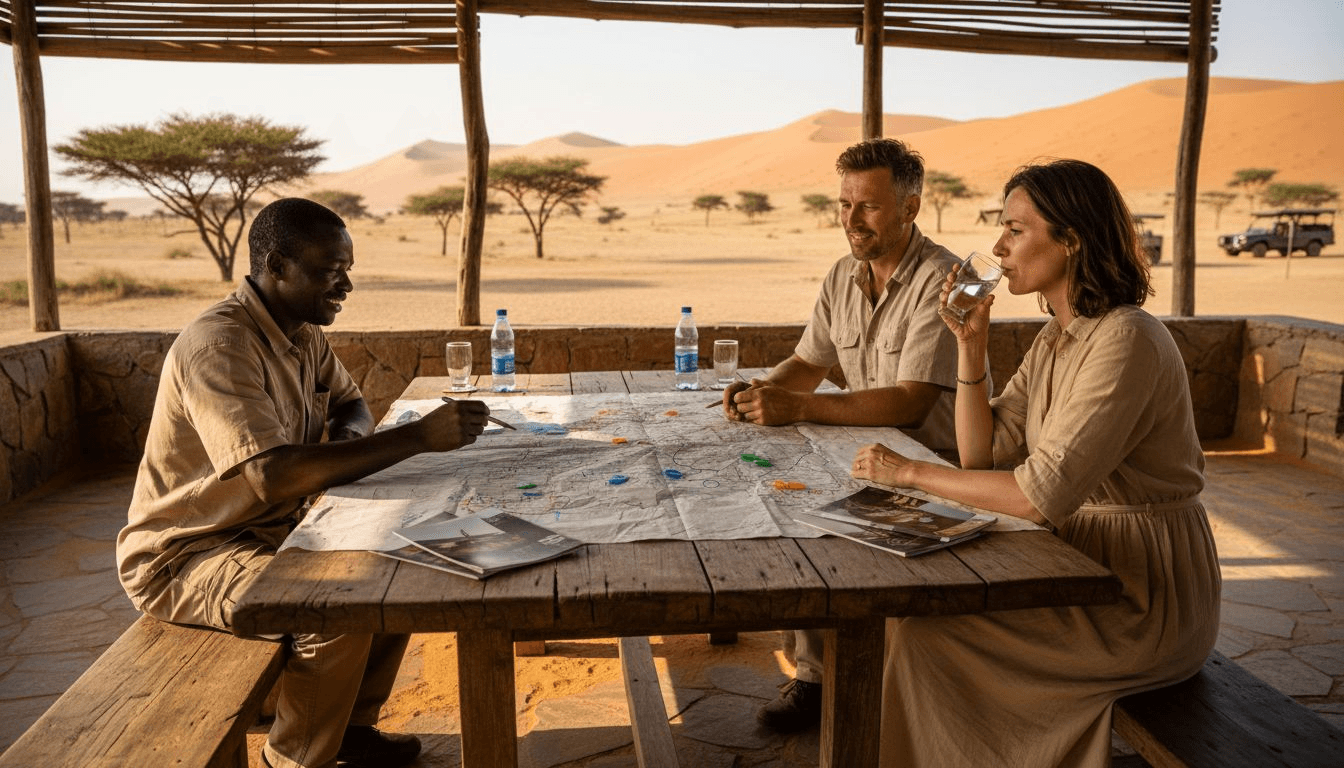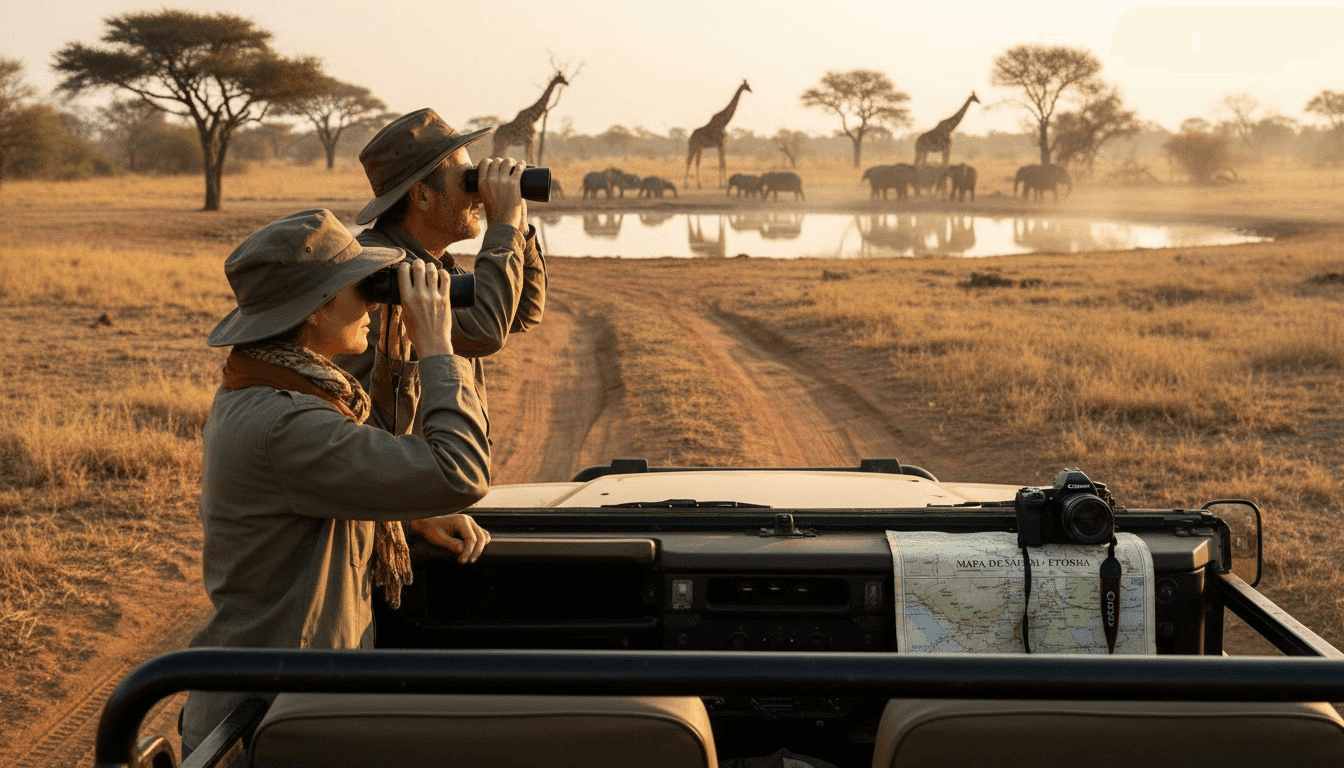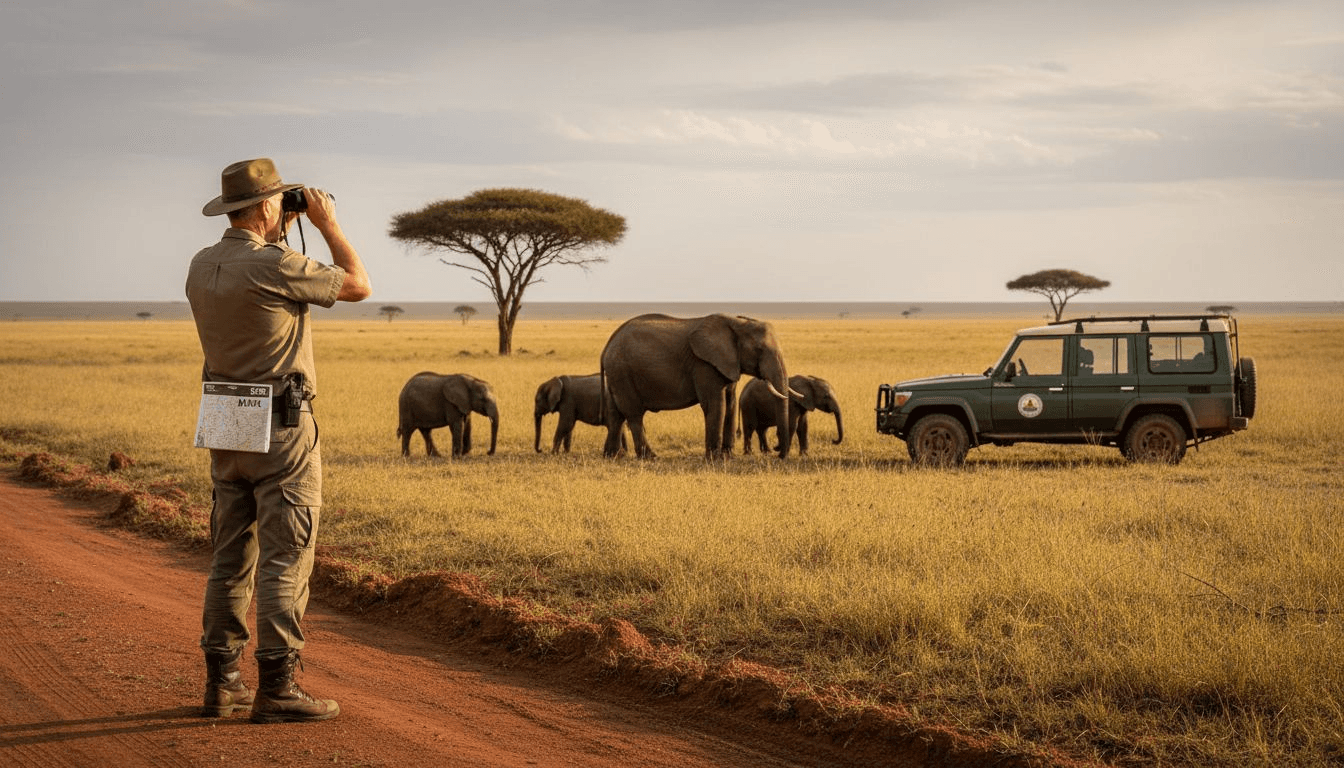7 Key Eco-Friendly Safari Benefits for Travelers
7 Key Eco-Friendly Safari Benefits for Travelers
Nov 19, 2025
Discover eco-friendly safari benefits. Learn 7 essential tips for an unforgettable and sustainable travel experience in nature.

7 Key Eco-Friendly Safari Benefits for Travelers
Eco-friendly safaris are changing the way people travel across Africa and placing conservation at the heart of every adventure. Most people think a safari is just about ticking off the Big Five or watching herds on the open plains. But the real story is different. Sustainable safari practices can reduce environmental impact by up to 50 percent and directly support local economies and wildlife protection. The best part? Every experience lets travelers become active contributors to preserving wild places for future generations.
Table of Contents
Understanding Eco-Friendly Safaris
Supporting Local Communities And Economies
Minimizing Environmental Impact
Enhancing Wildlife Conservation Efforts
Experiencing Authentic Cultural Interactions
Enjoying Unique And Sustainable Accommodations
Creating Lasting Memories With Nature
Quick Summary
Takeaway | Explanation |
|---|---|
Eco-friendly safaris promote environmental conservation. | These safaris prioritize low-impact tourism and habitat protection to support biodiversity. |
Travelers directly support local communities. | Tourism revenues from eco-friendly safaris empower local economies through job creation and skill development. |
Sustainable accommodations reduce carbon footprints. | Eco-friendly lodgings utilize renewable resources and sustainable designs that minimize environmental impact. |
Meaningful cultural exchanges enrich traveler experiences. | Travelers engage authentically with indigenous communities, fostering mutual respect and learning opportunities. |
Nature experiences encourage personal transformation. | Immersive safaris lead to deeper connections with nature, enhancing environmental awareness and empathy. |
1: Understanding Eco-Friendly Safaris
Eco-friendly safaris represent a transformative approach to wildlife tourism that prioritizes environmental conservation, sustainable practices, and meaningful traveler experiences. These specialized safari adventures go beyond traditional wildlife viewing, integrating responsible tourism principles that protect natural habitats, support local communities, and minimize ecological impact.
At their core, eco-friendly safaris are designed to create a harmonious relationship between travelers, wildlife, and local ecosystems. Unlike conventional tourism models, these experiences focus on generating positive environmental and social outcomes. Explore our sustainable safari options that demonstrate how luxury travel can coexist with ecological preservation.
The fundamental principles of eco-friendly safaris encompass several critical aspects:
Minimal Environmental Footprint: Utilizing low-impact transportation and accommodation
Community Engagement: Supporting local economies and indigenous conservation efforts
Wildlife Protection: Prioritizing animal welfare and habitat preservation
Educational Experience: Providing travelers with deeper understanding of ecological systems
According to United Nations World Tourism Organization, sustainable tourism practices like eco-friendly safaris can generate significant economic opportunities while protecting biodiversity. These experiences allow travelers to witness incredible wildlife and landscapes while contributing directly to conservation efforts.
By choosing an eco-friendly safari, travelers become active participants in global environmental stewardship. They’re not merely observers but contributors to a larger mission of preserving our planet’s most precious ecosystems. Each safari becomes a meaningful journey of discovery, connection, and responsible exploration.
2: Supporting Local Communities and Economies
Eco-friendly safaris serve as powerful mechanisms for economic empowerment and social development in rural African regions. By strategically channeling tourism revenue directly into local communities, these experiences transform traditional wildlife encounters into meaningful socioeconomic interventions. Discover our commitment to community development and how sustainable tourism creates lasting positive impact.
Economic Transformation Through Tourism
Local communities benefit from eco-friendly safari models through multiple interconnected channels. These experiences create sustainable employment opportunities, develop critical skills, and generate income streams that extend far beyond traditional economic limitations.
The key mechanisms of community support include:
Employing local guides and staff from surrounding regions
Investing tourism revenues into community infrastructure projects
Supporting local craft industries and traditional economic practices
Providing educational and skills training programs
According to World Travel & Tourism Council, sustainable tourism can generate significant economic multiplier effects. In regions like Namibia, these approaches have demonstrated remarkable potential for transforming rural economies by creating direct and indirect employment opportunities.
Cultural Preservation and Empowerment
Beyond economic benefits, eco-friendly safaris play a crucial role in cultural preservation. By creating economic value around traditional knowledge and practices, these experiences incentivize younger generations to maintain and respect their cultural heritage. Indigenous communities become active participants in conservation efforts, transforming from passive observers to critical stakeholders in environmental management.
Through carefully designed tourism models, local communities gain economic agency while maintaining their cultural integrity. Travelers contribute directly to sustainable development, creating a symbiotic relationship that benefits both visitors and host communities.
3: Minimizing Environmental Impact
Eco-friendly safaris represent a sophisticated approach to wildlife tourism that prioritizes environmental conservation and ecological preservation. These carefully designed experiences aim to reduce the carbon footprint and protect fragile ecosystems while providing travelers with immersive and responsible wildlife encounters. Learn more about our sustainable safari approaches that demonstrate our commitment to minimizing environmental impact.
The fundamental strategies for reducing ecological disruption during safari experiences encompass multiple sophisticated techniques. Sustainable safari operators implement comprehensive environmental protection protocols that go far beyond traditional tourism practices.
Key environmental mitigation strategies include:
Utilizing renewable energy sources at safari lodges
Implementing strict waste management and recycling programs
Minimizing vehicle emissions through carefully planned routes
Using energy-efficient transportation and accommodation infrastructure
According to International Ecotourism Society, responsible tourism can significantly reduce environmental degradation while supporting conservation efforts. These approaches are critical in preserving biodiversity and maintaining the delicate balance of natural ecosystems.
Carbon Footprint Reduction
Advanced eco-friendly safaris employ sophisticated carbon offsetting mechanisms. These strategies involve calculating the environmental impact of each safari experience and investing in conservation projects that neutralize or reduce greenhouse gas emissions. Travelers become active participants in environmental restoration, transforming their wildlife adventure into a meaningful contribution to global ecological preservation.
By choosing eco-friendly safari experiences, travelers make a direct and tangible impact on environmental conservation. Each journey becomes an opportunity to support sustainable practices and protect the planet’s most precious wilderness areas.
4: Enhancing Wildlife Conservation Efforts
Eco-friendly safaris play a pivotal role in advancing critical wildlife conservation strategies by transforming tourism into a powerful mechanism for ecosystem protection. These experiences create a direct financial and awareness pipeline that supports endangered species preservation and habitat restoration. Explore our wildlife conservation safari experiences to understand how tourism can drive meaningful ecological impact.
Conservation Through Engagement
Modern safari experiences are no longer passive wildlife viewing opportunities but active participation in global conservation efforts. Travelers become critical partners in protecting vulnerable ecosystems and endangered species through carefully designed experiences that generate tangible environmental benefits.
Key wildlife conservation mechanisms include:
Direct funding of anti-poaching initiatives
Supporting scientific research and wildlife monitoring programs
Protecting critical habitat zones through sustainable tourism revenue
Creating economic incentives for local communities to preserve wildlife
According to World Wildlife Fund, responsible tourism can generate substantial resources for protecting biodiversity. These approaches transform travelers from passive observers into active contributors to global wildlife preservation.
Research and Monitoring
Eco-friendly safari operators collaborate closely with scientific research institutions to gather critical data about wildlife populations, migration patterns, and ecosystem health. Advanced tracking technologies and citizen science programs enable travelers to contribute directly to understanding and protecting complex natural systems.
By selecting eco-friendly safari experiences, travelers make a profound statement about their commitment to wildlife conservation. These journeys transcend traditional tourism, offering a meaningful pathway to support global biodiversity protection and environmental stewardship.
5: Experiencing Authentic Cultural Interactions
Eco-friendly safaris provide travelers with extraordinary opportunities to engage in genuine cultural exchanges that transcend traditional tourism experiences. These immersive journeys allow visitors to connect deeply with indigenous communities, understanding their traditions, challenges, and profound relationship with their natural environment. Discover our culturally rich safari experiences that prioritize meaningful human connections.
Respectful Cultural Engagement
Unlike conventional tourism models that often commodify cultural experiences, eco-friendly safaris emphasize mutual respect, learning, and authentic interactions. These experiences are carefully designed to ensure that local communities retain agency and dignity while sharing their cultural heritage with international travelers.
Key principles of meaningful cultural interactions include:
Obtaining informed consent from indigenous communities
Compensating local participants fairly for their time and knowledge
Maintaining cultural protocols and traditional practices
Promoting cross-cultural understanding and mutual respect
According to UNESCO, sustainable tourism can play a crucial role in preserving intangible cultural heritage while generating economic opportunities for marginalized communities. These interactions become powerful platforms for cultural preservation and global understanding.
Knowledge Exchange and Empowerment
Eco-friendly safari experiences transform cultural interactions from passive observation to active knowledge exchange. Travelers learn traditional survival skills, indigenous ecological knowledge, and complex cultural practices directly from community members. This approach challenges traditional power dynamics in tourism, creating spaces of genuine learning and mutual respect.
Through thoughtful, ethical cultural interactions, eco-friendly safaris offer travelers profound insights into human diversity, resilience, and the intricate connections between people and their environments. Each interaction becomes an opportunity for personal transformation and deeper global understanding.
6: Enjoying Unique and Sustainable Accommodations
Sustainable safari accommodations represent a revolutionary approach to hospitality that seamlessly blends luxury, comfort, and environmental responsibility. These innovative lodging experiences transform traditional accommodation models by integrating ecological principles, local design aesthetics, and minimal environmental impact. Explore our sustainable accommodation options that redefine eco-friendly travel experiences.
Innovative Design and Ecological Integration
Eco-friendly safari accommodations go beyond standard green practices, creating immersive environments that are intrinsically connected to their natural surroundings. These remarkable spaces are designed to minimize ecological disruption while providing travelers with extraordinary comfort and authentic wilderness experiences.
Key characteristics of sustainable safari accommodations include:
Utilizing renewable energy sources like solar power
Implementing advanced water conservation techniques
Using locally sourced, sustainable building materials
Designing structures that blend seamlessly with natural landscapes
According to Green Hotelier, sustainable accommodation practices can reduce environmental impact by up to 50% compared to traditional hospitality models. These approaches demonstrate how luxury and ecological responsibility can coexist harmoniously.
Technological and Cultural Innovation
Advanced sustainable technologies enable safari accommodations to create zero-waste environments that provide exceptional guest experiences. From passive cooling systems inspired by traditional architectural techniques to sophisticated rainwater harvesting mechanisms, these lodgings represent the pinnacle of ecological design.
By choosing sustainable accommodations, travelers participate in a broader movement of responsible tourism. Each night spent in these extraordinary spaces becomes a direct contribution to environmental conservation and sustainable development, transforming the traditional hospitality model into a powerful mechanism for positive ecological impact.
7: Creating Lasting Memories with Nature
Eco-friendly safaris offer travelers transformative experiences that transcend traditional tourism, creating profound personal connections with the natural world. These journeys are designed to inspire deep emotional and intellectual engagement with wilderness environments, fostering lasting memories that extend far beyond typical vacation experiences. Discover our immersive nature experiences that promise life-changing encounters with wildlife and landscapes.
Emotional and Psychological Connection
Beyond visual spectacles, eco-friendly safaris provide travelers with opportunities for meaningful introspection and personal growth. These experiences challenge individuals to reconsider their relationship with nature, encouraging a more holistic understanding of ecological interconnectedness and human responsibility.
Key elements of transformative nature experiences include:
Guided meditation and mindfulness practices in wilderness settings
Storytelling sessions with indigenous community elders
Hands-on conservation and tracking experiences
Photography and artistic documentation of natural environments
According to Nature Conservancy, immersive nature experiences can fundamentally alter an individual’s environmental awareness and personal perspective.
Personal Transformation and Learning
Scientific research demonstrates that profound nature experiences can trigger neurological and psychological shifts, enhancing empathy, reducing stress, and increasing environmental consciousness. Travelers return from eco-friendly safaris not just with photographs, but with a fundamentally altered worldview that connects them more deeply to global ecological systems.
These journeys represent more than travel; they are profound personal pilgrimages that reconnect humans with the intricate, beautiful web of life. Each moment becomes a memory, each experience a lesson in the delicate, magnificent complexity of our natural world.
Below is a comprehensive table summarising the 7 key eco-friendly safari benefits for travellers as discussed in the article.
Benefit/Aspect | Description | Impact/Outcome |
|---|---|---|
Environmental Conservation | Safaris with sustainable practices reduce environmental impact by prioritising habitat protection and biodiversity. | Helps protect ecosystems for future generations. |
Support for Local Communities | Eco-friendly tourism channels funds and jobs to local people, aids in skills development, and empowers rural economies. | Drives economic growth and cultural preservation. |
Reduced Environmental Footprint | Use of renewable energy, eco-lodges, efficient transport, and strict waste management lowers safari carbon emissions. | Shrinks travellers’ ecological footprint. |
Enhanced Wildlife Conservation | Tourism revenue funds anti-poaching, research, and habitat restoration via guided and participative safari activities. | Actively protects endangered species. |
Authentic Cultural Interactions | Safaris engage visitors with indigenous cultures respectfully, fostering cross-cultural understanding and meaningful learning. | Promotes respect, learning, and community empowerment. |
Unique Sustainable Accommodations | Lodges utilise local materials, water conservation, and blend with the landscape for eco-conscious comfort. | Offers luxury with low environmental impact. |
Personal Connection with Nature | Immersive experiences such as mindfulness, traditional storytelling, and conservation tasks deepen the bond with the wild. | Fosters personal transformation, empathy, and awareness. |
Ready to Travel With Purpose? Experience Namibia’s Most Impactful Eco-Friendly Safaris
If you are searching for a safari that truly matters, the benefits outlined in “7 Key Eco-Friendly Safari Benefits for Travelers” highlight a real challenge: how to explore Africa’s wild beauty while protecting the environment, empowering local communities, and having meaningful cultural experiences. Many travellers want to leave a positive footprint, yet worry about traditional tourism’s impact on nature and people. Secret Namibia is here to solve exactly these concerns. Our bespoke safari packages combine minimal environmental impact, critical community engagement, and enriching wildlife encounters that reflect your values and deliver unforgettable moments.

Why settle for ordinary travel when you can make every journey count? Start planning your own eco-friendly adventure with our personalised luxury safaris. Explore our family-friendly sustainable trips or discover immersive fly-in experiences across Namibia’s most breathtaking regions. Visit Secret Namibia now to connect with our expert planners and secure a journey that makes a lasting difference. The future of travel is responsible, exclusive, and deeply rewarding – don’t wait to join it.
Frequently Asked Questions
What are the main benefits of choosing eco-friendly safaris?
Eco-friendly safaris provide benefits such as minimal environmental impact, support for local communities, enhanced wildlife conservation efforts, and opportunities for unique cultural interactions. To experience these benefits, prioritize safari operators that emphasize sustainability and community engagement in their practices.
How can I ensure my safari minimizes environmental impact?
To minimize environmental impact, choose safari operators that use renewable energy, implement waste management practices, and prioritize low-emission transportation. Look for accommodations specifically designed to blend with nature, as these often have substantial ecological benefits.
What can I expect from the cultural interactions during an eco-friendly safari?
During an eco-friendly safari, you can expect respectful and meaningful interactions with local communities, enhancing your understanding of their culture and traditions. Engage with local guides to learn about their heritage, participate in cultural practices, and support economic empowerment initiatives through fair compensation.
How do eco-friendly safaris contribute to wildlife conservation?
Eco-friendly safaris contribute to wildlife conservation by directing tourism revenue towards protecting endangered species, funding anti-poaching initiatives, and supporting habitat restoration projects. Seek safaris that include educational components, allowing you to actively participate in conservation efforts through activities like wildlife monitoring.
Can eco-friendly safaris enhance my personal connection with nature?
Yes, eco-friendly safaris are designed to foster a deep emotional and psychological connection with the natural world. Participate in guided activities such as mindfulness sessions in natural settings or conservation efforts to cultivate greater awareness and appreciation of your surroundings.
What types of accommodations should I look for on an eco-friendly safari?
Look for accommodations that utilize sustainable building materials, renewable energy sources, and water conservation techniques. Choose lodges that seamlessly integrate with their environment to ensure a luxury experience while minimizing ecological disruption.
Recommended
7 Key Eco-Friendly Safari Benefits for Travelers
Eco-friendly safaris are changing the way people travel across Africa and placing conservation at the heart of every adventure. Most people think a safari is just about ticking off the Big Five or watching herds on the open plains. But the real story is different. Sustainable safari practices can reduce environmental impact by up to 50 percent and directly support local economies and wildlife protection. The best part? Every experience lets travelers become active contributors to preserving wild places for future generations.
Table of Contents
Understanding Eco-Friendly Safaris
Supporting Local Communities And Economies
Minimizing Environmental Impact
Enhancing Wildlife Conservation Efforts
Experiencing Authentic Cultural Interactions
Enjoying Unique And Sustainable Accommodations
Creating Lasting Memories With Nature
Quick Summary
Takeaway | Explanation |
|---|---|
Eco-friendly safaris promote environmental conservation. | These safaris prioritize low-impact tourism and habitat protection to support biodiversity. |
Travelers directly support local communities. | Tourism revenues from eco-friendly safaris empower local economies through job creation and skill development. |
Sustainable accommodations reduce carbon footprints. | Eco-friendly lodgings utilize renewable resources and sustainable designs that minimize environmental impact. |
Meaningful cultural exchanges enrich traveler experiences. | Travelers engage authentically with indigenous communities, fostering mutual respect and learning opportunities. |
Nature experiences encourage personal transformation. | Immersive safaris lead to deeper connections with nature, enhancing environmental awareness and empathy. |
1: Understanding Eco-Friendly Safaris
Eco-friendly safaris represent a transformative approach to wildlife tourism that prioritizes environmental conservation, sustainable practices, and meaningful traveler experiences. These specialized safari adventures go beyond traditional wildlife viewing, integrating responsible tourism principles that protect natural habitats, support local communities, and minimize ecological impact.
At their core, eco-friendly safaris are designed to create a harmonious relationship between travelers, wildlife, and local ecosystems. Unlike conventional tourism models, these experiences focus on generating positive environmental and social outcomes. Explore our sustainable safari options that demonstrate how luxury travel can coexist with ecological preservation.
The fundamental principles of eco-friendly safaris encompass several critical aspects:
Minimal Environmental Footprint: Utilizing low-impact transportation and accommodation
Community Engagement: Supporting local economies and indigenous conservation efforts
Wildlife Protection: Prioritizing animal welfare and habitat preservation
Educational Experience: Providing travelers with deeper understanding of ecological systems
According to United Nations World Tourism Organization, sustainable tourism practices like eco-friendly safaris can generate significant economic opportunities while protecting biodiversity. These experiences allow travelers to witness incredible wildlife and landscapes while contributing directly to conservation efforts.
By choosing an eco-friendly safari, travelers become active participants in global environmental stewardship. They’re not merely observers but contributors to a larger mission of preserving our planet’s most precious ecosystems. Each safari becomes a meaningful journey of discovery, connection, and responsible exploration.
2: Supporting Local Communities and Economies
Eco-friendly safaris serve as powerful mechanisms for economic empowerment and social development in rural African regions. By strategically channeling tourism revenue directly into local communities, these experiences transform traditional wildlife encounters into meaningful socioeconomic interventions. Discover our commitment to community development and how sustainable tourism creates lasting positive impact.
Economic Transformation Through Tourism
Local communities benefit from eco-friendly safari models through multiple interconnected channels. These experiences create sustainable employment opportunities, develop critical skills, and generate income streams that extend far beyond traditional economic limitations.
The key mechanisms of community support include:
Employing local guides and staff from surrounding regions
Investing tourism revenues into community infrastructure projects
Supporting local craft industries and traditional economic practices
Providing educational and skills training programs
According to World Travel & Tourism Council, sustainable tourism can generate significant economic multiplier effects. In regions like Namibia, these approaches have demonstrated remarkable potential for transforming rural economies by creating direct and indirect employment opportunities.
Cultural Preservation and Empowerment
Beyond economic benefits, eco-friendly safaris play a crucial role in cultural preservation. By creating economic value around traditional knowledge and practices, these experiences incentivize younger generations to maintain and respect their cultural heritage. Indigenous communities become active participants in conservation efforts, transforming from passive observers to critical stakeholders in environmental management.
Through carefully designed tourism models, local communities gain economic agency while maintaining their cultural integrity. Travelers contribute directly to sustainable development, creating a symbiotic relationship that benefits both visitors and host communities.
3: Minimizing Environmental Impact
Eco-friendly safaris represent a sophisticated approach to wildlife tourism that prioritizes environmental conservation and ecological preservation. These carefully designed experiences aim to reduce the carbon footprint and protect fragile ecosystems while providing travelers with immersive and responsible wildlife encounters. Learn more about our sustainable safari approaches that demonstrate our commitment to minimizing environmental impact.
The fundamental strategies for reducing ecological disruption during safari experiences encompass multiple sophisticated techniques. Sustainable safari operators implement comprehensive environmental protection protocols that go far beyond traditional tourism practices.
Key environmental mitigation strategies include:
Utilizing renewable energy sources at safari lodges
Implementing strict waste management and recycling programs
Minimizing vehicle emissions through carefully planned routes
Using energy-efficient transportation and accommodation infrastructure
According to International Ecotourism Society, responsible tourism can significantly reduce environmental degradation while supporting conservation efforts. These approaches are critical in preserving biodiversity and maintaining the delicate balance of natural ecosystems.
Carbon Footprint Reduction
Advanced eco-friendly safaris employ sophisticated carbon offsetting mechanisms. These strategies involve calculating the environmental impact of each safari experience and investing in conservation projects that neutralize or reduce greenhouse gas emissions. Travelers become active participants in environmental restoration, transforming their wildlife adventure into a meaningful contribution to global ecological preservation.
By choosing eco-friendly safari experiences, travelers make a direct and tangible impact on environmental conservation. Each journey becomes an opportunity to support sustainable practices and protect the planet’s most precious wilderness areas.
4: Enhancing Wildlife Conservation Efforts
Eco-friendly safaris play a pivotal role in advancing critical wildlife conservation strategies by transforming tourism into a powerful mechanism for ecosystem protection. These experiences create a direct financial and awareness pipeline that supports endangered species preservation and habitat restoration. Explore our wildlife conservation safari experiences to understand how tourism can drive meaningful ecological impact.
Conservation Through Engagement
Modern safari experiences are no longer passive wildlife viewing opportunities but active participation in global conservation efforts. Travelers become critical partners in protecting vulnerable ecosystems and endangered species through carefully designed experiences that generate tangible environmental benefits.
Key wildlife conservation mechanisms include:
Direct funding of anti-poaching initiatives
Supporting scientific research and wildlife monitoring programs
Protecting critical habitat zones through sustainable tourism revenue
Creating economic incentives for local communities to preserve wildlife
According to World Wildlife Fund, responsible tourism can generate substantial resources for protecting biodiversity. These approaches transform travelers from passive observers into active contributors to global wildlife preservation.
Research and Monitoring
Eco-friendly safari operators collaborate closely with scientific research institutions to gather critical data about wildlife populations, migration patterns, and ecosystem health. Advanced tracking technologies and citizen science programs enable travelers to contribute directly to understanding and protecting complex natural systems.
By selecting eco-friendly safari experiences, travelers make a profound statement about their commitment to wildlife conservation. These journeys transcend traditional tourism, offering a meaningful pathway to support global biodiversity protection and environmental stewardship.
5: Experiencing Authentic Cultural Interactions
Eco-friendly safaris provide travelers with extraordinary opportunities to engage in genuine cultural exchanges that transcend traditional tourism experiences. These immersive journeys allow visitors to connect deeply with indigenous communities, understanding their traditions, challenges, and profound relationship with their natural environment. Discover our culturally rich safari experiences that prioritize meaningful human connections.
Respectful Cultural Engagement
Unlike conventional tourism models that often commodify cultural experiences, eco-friendly safaris emphasize mutual respect, learning, and authentic interactions. These experiences are carefully designed to ensure that local communities retain agency and dignity while sharing their cultural heritage with international travelers.
Key principles of meaningful cultural interactions include:
Obtaining informed consent from indigenous communities
Compensating local participants fairly for their time and knowledge
Maintaining cultural protocols and traditional practices
Promoting cross-cultural understanding and mutual respect
According to UNESCO, sustainable tourism can play a crucial role in preserving intangible cultural heritage while generating economic opportunities for marginalized communities. These interactions become powerful platforms for cultural preservation and global understanding.
Knowledge Exchange and Empowerment
Eco-friendly safari experiences transform cultural interactions from passive observation to active knowledge exchange. Travelers learn traditional survival skills, indigenous ecological knowledge, and complex cultural practices directly from community members. This approach challenges traditional power dynamics in tourism, creating spaces of genuine learning and mutual respect.
Through thoughtful, ethical cultural interactions, eco-friendly safaris offer travelers profound insights into human diversity, resilience, and the intricate connections between people and their environments. Each interaction becomes an opportunity for personal transformation and deeper global understanding.
6: Enjoying Unique and Sustainable Accommodations
Sustainable safari accommodations represent a revolutionary approach to hospitality that seamlessly blends luxury, comfort, and environmental responsibility. These innovative lodging experiences transform traditional accommodation models by integrating ecological principles, local design aesthetics, and minimal environmental impact. Explore our sustainable accommodation options that redefine eco-friendly travel experiences.
Innovative Design and Ecological Integration
Eco-friendly safari accommodations go beyond standard green practices, creating immersive environments that are intrinsically connected to their natural surroundings. These remarkable spaces are designed to minimize ecological disruption while providing travelers with extraordinary comfort and authentic wilderness experiences.
Key characteristics of sustainable safari accommodations include:
Utilizing renewable energy sources like solar power
Implementing advanced water conservation techniques
Using locally sourced, sustainable building materials
Designing structures that blend seamlessly with natural landscapes
According to Green Hotelier, sustainable accommodation practices can reduce environmental impact by up to 50% compared to traditional hospitality models. These approaches demonstrate how luxury and ecological responsibility can coexist harmoniously.
Technological and Cultural Innovation
Advanced sustainable technologies enable safari accommodations to create zero-waste environments that provide exceptional guest experiences. From passive cooling systems inspired by traditional architectural techniques to sophisticated rainwater harvesting mechanisms, these lodgings represent the pinnacle of ecological design.
By choosing sustainable accommodations, travelers participate in a broader movement of responsible tourism. Each night spent in these extraordinary spaces becomes a direct contribution to environmental conservation and sustainable development, transforming the traditional hospitality model into a powerful mechanism for positive ecological impact.
7: Creating Lasting Memories with Nature
Eco-friendly safaris offer travelers transformative experiences that transcend traditional tourism, creating profound personal connections with the natural world. These journeys are designed to inspire deep emotional and intellectual engagement with wilderness environments, fostering lasting memories that extend far beyond typical vacation experiences. Discover our immersive nature experiences that promise life-changing encounters with wildlife and landscapes.
Emotional and Psychological Connection
Beyond visual spectacles, eco-friendly safaris provide travelers with opportunities for meaningful introspection and personal growth. These experiences challenge individuals to reconsider their relationship with nature, encouraging a more holistic understanding of ecological interconnectedness and human responsibility.
Key elements of transformative nature experiences include:
Guided meditation and mindfulness practices in wilderness settings
Storytelling sessions with indigenous community elders
Hands-on conservation and tracking experiences
Photography and artistic documentation of natural environments
According to Nature Conservancy, immersive nature experiences can fundamentally alter an individual’s environmental awareness and personal perspective.
Personal Transformation and Learning
Scientific research demonstrates that profound nature experiences can trigger neurological and psychological shifts, enhancing empathy, reducing stress, and increasing environmental consciousness. Travelers return from eco-friendly safaris not just with photographs, but with a fundamentally altered worldview that connects them more deeply to global ecological systems.
These journeys represent more than travel; they are profound personal pilgrimages that reconnect humans with the intricate, beautiful web of life. Each moment becomes a memory, each experience a lesson in the delicate, magnificent complexity of our natural world.
Below is a comprehensive table summarising the 7 key eco-friendly safari benefits for travellers as discussed in the article.
Benefit/Aspect | Description | Impact/Outcome |
|---|---|---|
Environmental Conservation | Safaris with sustainable practices reduce environmental impact by prioritising habitat protection and biodiversity. | Helps protect ecosystems for future generations. |
Support for Local Communities | Eco-friendly tourism channels funds and jobs to local people, aids in skills development, and empowers rural economies. | Drives economic growth and cultural preservation. |
Reduced Environmental Footprint | Use of renewable energy, eco-lodges, efficient transport, and strict waste management lowers safari carbon emissions. | Shrinks travellers’ ecological footprint. |
Enhanced Wildlife Conservation | Tourism revenue funds anti-poaching, research, and habitat restoration via guided and participative safari activities. | Actively protects endangered species. |
Authentic Cultural Interactions | Safaris engage visitors with indigenous cultures respectfully, fostering cross-cultural understanding and meaningful learning. | Promotes respect, learning, and community empowerment. |
Unique Sustainable Accommodations | Lodges utilise local materials, water conservation, and blend with the landscape for eco-conscious comfort. | Offers luxury with low environmental impact. |
Personal Connection with Nature | Immersive experiences such as mindfulness, traditional storytelling, and conservation tasks deepen the bond with the wild. | Fosters personal transformation, empathy, and awareness. |
Ready to Travel With Purpose? Experience Namibia’s Most Impactful Eco-Friendly Safaris
If you are searching for a safari that truly matters, the benefits outlined in “7 Key Eco-Friendly Safari Benefits for Travelers” highlight a real challenge: how to explore Africa’s wild beauty while protecting the environment, empowering local communities, and having meaningful cultural experiences. Many travellers want to leave a positive footprint, yet worry about traditional tourism’s impact on nature and people. Secret Namibia is here to solve exactly these concerns. Our bespoke safari packages combine minimal environmental impact, critical community engagement, and enriching wildlife encounters that reflect your values and deliver unforgettable moments.

Why settle for ordinary travel when you can make every journey count? Start planning your own eco-friendly adventure with our personalised luxury safaris. Explore our family-friendly sustainable trips or discover immersive fly-in experiences across Namibia’s most breathtaking regions. Visit Secret Namibia now to connect with our expert planners and secure a journey that makes a lasting difference. The future of travel is responsible, exclusive, and deeply rewarding – don’t wait to join it.
Frequently Asked Questions
What are the main benefits of choosing eco-friendly safaris?
Eco-friendly safaris provide benefits such as minimal environmental impact, support for local communities, enhanced wildlife conservation efforts, and opportunities for unique cultural interactions. To experience these benefits, prioritize safari operators that emphasize sustainability and community engagement in their practices.
How can I ensure my safari minimizes environmental impact?
To minimize environmental impact, choose safari operators that use renewable energy, implement waste management practices, and prioritize low-emission transportation. Look for accommodations specifically designed to blend with nature, as these often have substantial ecological benefits.
What can I expect from the cultural interactions during an eco-friendly safari?
During an eco-friendly safari, you can expect respectful and meaningful interactions with local communities, enhancing your understanding of their culture and traditions. Engage with local guides to learn about their heritage, participate in cultural practices, and support economic empowerment initiatives through fair compensation.
How do eco-friendly safaris contribute to wildlife conservation?
Eco-friendly safaris contribute to wildlife conservation by directing tourism revenue towards protecting endangered species, funding anti-poaching initiatives, and supporting habitat restoration projects. Seek safaris that include educational components, allowing you to actively participate in conservation efforts through activities like wildlife monitoring.
Can eco-friendly safaris enhance my personal connection with nature?
Yes, eco-friendly safaris are designed to foster a deep emotional and psychological connection with the natural world. Participate in guided activities such as mindfulness sessions in natural settings or conservation efforts to cultivate greater awareness and appreciation of your surroundings.
What types of accommodations should I look for on an eco-friendly safari?
Look for accommodations that utilize sustainable building materials, renewable energy sources, and water conservation techniques. Choose lodges that seamlessly integrate with their environment to ensure a luxury experience while minimizing ecological disruption.
Recommended
RELATED
Safari Guides

Feb 18, 2026
Safari Customisation: Creating Your Unique Namibian Journey
Safari customisation gives travellers tailored adventures in Namibia. Discover types, key features, costs, risks and common mistakes to avoid.

Feb 18, 2026
How to Maximize Safari Experiences for Luxury Travellers
Discover how to maximise safari experiences with step-by-step strategies for preparation, onsite adventures, and quality checks for unforgettable luxury wildlife encounters.

Feb 18, 2026
Pourquoi visiter Fish River Canyon : Luxe, aventure et émotions
Pourquoi visiter Fish River Canyon ? Paysages spectaculaires, randonnées exclusives, expériences de luxe et nature pour un safari haut de gamme en Namibie.

Feb 18, 2026
7 listas de animales en safaris esenciales para viajeros exclusivos
Descubre 7 listas de animales en safaris ideales para viajeros de lujo. Aprende a identificar especies únicas y maximiza tu experiencia de avistamiento.

Feb 18, 2026
7 claves para descubrir listas de parques nacionales africanos
Aprende cómo explorar listas de parques nacionales africanos con 7 consejos prácticos para viajeros de lujo que buscan experiencias únicas en safaris.

Feb 18, 2026
Pourquoi visiter Victoria Falls pour un safari luxe
Découvrez pourquoi visiter Victoria Falls, des activités d’aventure à la faune spectaculaire, en passant par les lodges de luxe et expériences familles.